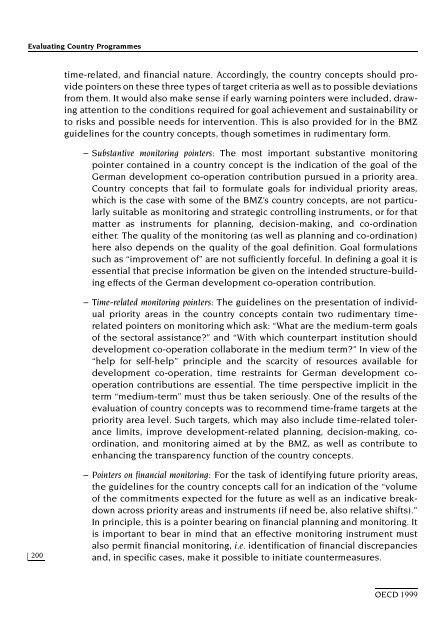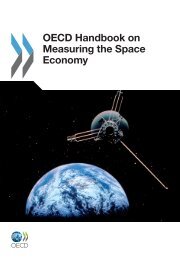Evaluating Country Programmes - OECD Online Bookshop
Evaluating Country Programmes - OECD Online Bookshop
Evaluating Country Programmes - OECD Online Bookshop
Create successful ePaper yourself
Turn your PDF publications into a flip-book with our unique Google optimized e-Paper software.
<strong>Evaluating</strong> <strong>Country</strong> <strong>Programmes</strong><br />
200<br />
time-related, and financial nature. Accordingly, the country concepts should provide<br />
pointers on these three types of target criteria as well as to possible deviations<br />
from them. It would also make sense if early warning pointers were included, drawing<br />
attention to the conditions required for goal achievement and sustainability or<br />
to risks and possible needs for intervention. This is also provided for in the BMZ<br />
guidelines for the country concepts, though sometimes in rudimentary form.<br />
– Substantive monitoring pointers: The most important substantive monitoring<br />
pointer contained in a country concept is the indication of the goal of the<br />
German development co-operation contribution pursued in a priority area.<br />
<strong>Country</strong> concepts that fail to formulate goals for individual priority areas,<br />
which is the case with some of the BMZ’s country concepts, are not particularly<br />
suitable as monitoring and strategic controlling instruments, or for that<br />
matter as instruments for planning, decision-making, and co-ordination<br />
either. The quality of the monitoring (as well as planning and co-ordination)<br />
here also depends on the quality of the goal definition. Goal formulations<br />
such as “improvement of” are not sufficiently forceful. In defining a goal it is<br />
essential that precise information be given on the intended structure-building<br />
effects of the German development co-operation contribution.<br />
– Time-related monitoring pointers: The guidelines on the presentation of individual<br />
priority areas in the country concepts contain two rudimentary timerelated<br />
pointers on monitoring which ask: “What are the medium-term goals<br />
of the sectoral assistance?” and “With which counterpart institution should<br />
development co-operation collaborate in the medium term?” In view of the<br />
“help for self-help” principle and the scarcity of resources available for<br />
development co-operation, time restraints for German development cooperation<br />
contributions are essential. The time perspective implicit in the<br />
term “medium-term” must thus be taken seriously. One of the results of the<br />
evaluation of country concepts was to recommend time-frame targets at the<br />
priority area level. Such targets, which may also include time-related tolerance<br />
limits, improve development-related planning, decision-making, coordination,<br />
and monitoring aimed at by the BMZ, as well as contribute to<br />
enhancing the transparency function of the country concepts.<br />
– Pointers on financial monitoring: For the task of identifying future priority areas,<br />
the guidelines for the country concepts call for an indication of the “volume<br />
of the commitments expected for the future as well as an indicative breakdown<br />
across priority areas and instruments (if need be, also relative shifts).”<br />
In principle, this is a pointer bearing on financial planning and monitoring. It<br />
is important to bear in mind that an effective monitoring instrument must<br />
also permit financial monitoring, i.e. identification of financial discrepancies<br />
and, in specific cases, make it possible to initiate countermeasures.<br />
<strong>OECD</strong> 1999

















![CQE=U]^\]Z: KAZAKHSTAN - OECD Online Bookshop](https://img.yumpu.com/3915768/1/190x253/cqeuz-kazakhstan-oecd-online-bookshop.jpg?quality=85)